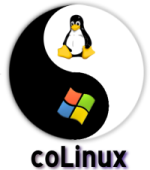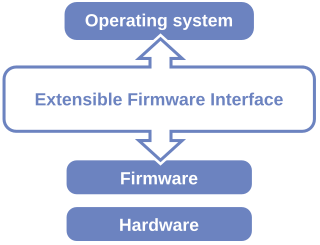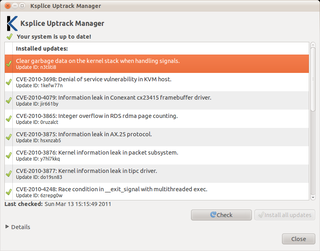
GNU is an extensive collection of free software, which can be used as an operating system or can be used in parts with other operating systems. The use of the completed GNU tools led to the family of operating systems popularly known as Linux. Most of GNU is licensed under the GNU Project's own General Public License (GPL).

A Linux distribution is an operating system made from a software collection that includes the Linux kernel and, often, a package management system. Linux users usually obtain their operating system by downloading one of the Linux distributions, which are available for a wide variety of systems ranging from embedded devices and personal computers to powerful supercomputers.
The Open Sound System (OSS) is an interface for making and capturing sound in Unix and Unix-like operating systems. It is based on standard Unix devices system calls. The term also sometimes refers to the software in a Unix kernel that provides the OSS interface; it can be thought of as a device driver for sound controller hardware. The goal of OSS is to allow the writing of sound-based applications that are agnostic of the underlying sound hardware.

GNU GRUB is a boot loader package from the GNU Project. GRUB is the reference implementation of the Free Software Foundation's Multiboot Specification, which provides a user the choice to boot one of multiple operating systems installed on a computer or select a specific kernel configuration available on a particular operating system's partitions.

The GNU C Library, commonly known as glibc, is the GNU Project's implementation of the C standard library. Despite its name, it now also directly supports C++. It was started in the 1980s by the Free Software Foundation (FSF) for the GNU operating system.

Cooperative Linux, abbreviated as coLinux, is software which allows Microsoft Windows and the Linux kernel to run simultaneously in parallel on the same machine.

The Unified Extensible Firmware Interface (UEFI) is a publicly available specification that defines a software interface between an operating system and platform firmware. UEFI replaces the legacy Basic Input/Output System (BIOS) firmware interface originally present in all IBM PC-compatible personal computers, with most UEFI firmware implementations providing support for legacy BIOS services. UEFI can support remote diagnostics and repair of computers, even with no operating system installed.

Ubuntu is a Linux distribution based on Debian and composed mostly of free and open-source software. Ubuntu is officially released in three editions: Desktop, Server, and Core for Internet of things devices and robots. All the editions can run on the computer alone, or in a virtual machine. Ubuntu is a popular operating system for cloud computing, with support for OpenStack. Ubuntu's default desktop has been GNOME since version 17.10.

A free and open-source graphics device driver is a software stack which controls computer-graphics hardware and supports graphics-rendering application programming interfaces (APIs) and is released under a free and open-source software license. Graphics device drivers are written for specific hardware to work within a specific operating system kernel and to support a range of APIs used by applications to access the graphics hardware. They may also control output to the display if the display driver is part of the graphics hardware. Most free and open-source graphics device drivers are developed by the Mesa project. The driver is made up of a compiler, a rendering API, and software which manages access to the graphics hardware.
In Linux systems, initrd is a scheme for loading a temporary root file system into memory, to be used as part of the Linux startup process. initrd and initramfs refer to two different methods of achieving this. Both are commonly used to make preparations before the real root file system can be mounted.

Linux is a family of open-source Unix-like operating systems based on the Linux kernel, an operating system kernel first released on September 17, 1991, by Linus Torvalds. Linux is typically packaged in a Linux distribution.
HAL is a software subsystem for UNIX-like operating systems providing hardware abstraction.
Linux began in 1991 as a personal project by Finnish student Linus Torvalds: to create a new free operating system kernel. The resulting Linux kernel has been marked by constant growth throughout its history. Since the initial release of its source code in 1991, it has grown from a small number of C files under a license prohibiting commercial distribution to the 4.15 version in 2018 with more than 23.3 million lines of source code, not counting comments, under the GNU General Public License v2.

Ksplice is an open-source extension of the Linux kernel that allows security patches to be applied to a running kernel without the need for reboots, avoiding downtimes and improving availability. Ksplice supports only the patches that do not make significant semantic changes to kernel's data structures.

Ubuntu Kylin is the official Chinese version of the Ubuntu computer operating system. It is intended for desktop and laptop computers, and has been described as a "loose continuation of the Chinese Kylin OS". In 2013, Canonical Ltd. reached an agreement with the Ministry of Industry and Information Technology of the People's Republic of China to co-create and release an Ubuntu-based operating system with features targeted at the Chinese market.

OpenZFS is a CDDL licensed open-source storage platform that encompasses the functionality of traditional filesystems and volume manager. It includes protection against data corruption, support for high storage capacities, efficient data compression, snapshots and copy-on-write clones, continuous integrity checking and automatic repair, encryption, remote replication with ZFS send and receive, and RAID-Z. The eponymous OpenZFS project brings together developers from the illumos, Linux, FreeBSD and macOS platforms, and a wide range of companies via the annual OpenZFS Developer Summit.

Zorin OS is a Linux distribution based on Ubuntu. It uses a GNOME 3 or XFCE 4 desktop environment as default, although the desktop is heavily customized in order to help Windows and macOS users transition to Linux easily. Wine and PlayOnLinux can be easily installed in Zorin OS, allowing users to run compatible Windows software for ease of transition from Windows. Zorin OS's creators maintain 3 free editions of the operating system, and a "Pro" edition for purchase.

Windows Subsystem for Linux (WSL) is a compatibility layer for running Linux binary executables natively on Windows 10, Windows 11, and Windows Server 2019.

ProcDump is a command-line application used for monitoring an application for CPU spikes and creating crash dumps during a spike. The crash dumps can then be used by an administrator or software developer to determine the cause of the spike. ProcDump supports monitoring of hung windows and unhandled exceptions. It can also create dumps based on the values of system performance counters.














